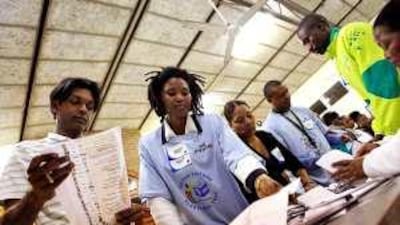JOHANNESBURG // Thousands of ecstatic supporters of the African National Congress gathered in the centre of Johannesburg last night to mark the party's retention of power in South Africa's fourth democratic election. But with millions of votes still to be counted, the question of whether it would retain its two-thirds majority in parliament - which technically gives it the ability to change the constitution, even though it has never done so - remained open.
After 9.1 million votes were tabulated - about half the expected total ? it was a little below the threshold, on 65.7 per cent, but analysts were reluctant to predict the final outcome. The mark is more symbolic than anything else, but with the ANC's share of the vote almost certain to go down for the first time since the end of apartheid in 1994 - it had risen in each of the three elections since then, to 69.7 per cent at the last poll in 2004 - it will be seen as a blow if it does not reach it. "It is not a victory celebration yet," the party said in a statement ahead of last night's event, in a possible illustration of internal ambivalence about the figures.
The opposition Democratic Alliance saw its share rise substantially, to 16 per cent in the latest figures, and was set to win the Western Cape province, while the Congress of the People (Cope), the breakaway party from the ANC, was a little below eight per cent. Ostensibly any governing party in a democracy would be delighted with a return to power and a vote share in the mid-60s. Nonetheless, with the winning party never in doubt the significance of the poll was more about future elections than the result on this occasion.
Jacob Zuma, the ANC leader who is now certain to be inaugurated as president next month, is a deeply polarising figure, hugely popular among his supporters but demonised by his opponents, having twice had corruption charges against him dropped on technicalities and once been tried and acquitted of rape. Even in his home village of Nxamalala, down kilometres of dirt roads deep in rural northern KwaZulu-Natal, the Zulu-based Inkatha Freedom Party took more than 17 per cent of the vote, and in Nkandla, the only town in the district, there were more posters on display for the IFP than the ANC.
There Thule Biyela, 30, a civil servant, said she voted for the IFP - "for someone who is a person that I trust, a person that I know, that when he does his job he does it with all his heart, it's not about money, it's not about status or position, it's about people, who puts people first". "Jacob Zuma does not," she made clear. "I'm very concerned about what is going to happen to South Africa. It seems we are not looking to make our nation into a better place."
The area has long been a stronghold of the IFP, which given its ethno-centricity will never mount a nationwide challenge, but her comments illustrate widely held doubts. The question is how Mr Zuma will respond to the election results, and what prospects there are for a plausible alternative in five years' time when the ANC will have been in power for a generation, which history suggests is the usual minimum for liberation party after its initial victory.
For Adam Habib, professor of political science at the University of Johannesburg, the most important question was who came second, as it "determines the prospects for a viable option in 2014 and 2019". As the Democratic Alliance, which draws most of its support from the white and mixed-race communities, had done so, he said it "will limit the growth of the alternative platform". In the long term, Cope, which is multiracial but mostly black and whose leaders have the "struggle credentials" that are still essential in South African politics, is the only existing opposition party that has the potential to present itself as a plausible rival government.
"The DA have done well but you need to put this in perspective," said Steven Friedman, of the Centre for the Study of Democracy. "They are not doing well because it made inroads into voters who had never voted for it before. "They have done very well with their limited resources and maximised their assets [but they have not made] some sort of breakthrough into a new group of voters and I don't think they will, so at some point they reach a ceiling.
"Cope have certainly done enough to survive and if they try and build on this, they remain a viable party. The danger is they become another opposition party with a dwindling support base. "What this election has been about is not the new politics but the old politics of identity. "On one level this is more of the same; on the other level it does have the potential to change politics here, because if the ANC is faced with an opposition party with a reasonable foothold which has some prospect of taking voters away from it, then you are dealing with a different dynamic.
"There's a new political environment out there." Mr Zuma, he said, was faced with a choice: the ANC could carry on taking voters for granted, or it could decide that "we really need to start listening to people". sberger@thenational.ae

